#Class 377
Explore tagged Tumblr posts
Text




See pinned for more info!
#natrail posts#natrail tournament#natrail polls#round 1#poll 29#Class 377#Class 196#Class 143#B90/B92/B2K Stock
28 notes
·
View notes
Text
Imagine only using one type of train

Couldn't be me
0 notes
Text

Today's mood
#I'm trying to study currently and oh my#there are 377 pages I need to study on just for one of my classes and after reading only 38 pages this is already a mood#I don't wanna fail so I have to keep on studying#but studying for this super boring stuff which has nothing to do with literature makes me feel nauseous and gives me a headache#it's just a lot of information my brain refuses to store#*sighs*#okay I'm getting back to stuDYING#eisy speaks
17 notes
·
View notes
Text
"Diary" - Jegulus microfic @into-the-jeggyverse - 377 words
-
James was very aware that Regulus wasn’t one for admitting his feelings, or displaying affection very openly. He didn’t mind, really. They had been dating for a little over a month, and James knew that it meant more to Regulus than he was comfortable letting on.
Currently, they were holding each other in James’s bed. Regulus had stayed here for the past few days after getting sick of Evan and Barty. James’s arms were wrapped tightly around Regulus, and the younger boy had his head buried in James’s neck.
“I love you,” James whispered into Regulus’s hair. He knew Regulus wouldn’t say it back. He could tell by the way he tensed up, pulled away ever so slightly. It was okay. James didn’t mind. It was enough for him that Regulus didn’t leave.
It wasn’t until the next day, when Regulus went back to his own dorm for the night, that James knew Regulus felt the same. He’d had his suspicions, his hopes, that Regulus was just too nervous to say out loud that he loved James, too, but he couldn’t be sure. If it wasn’t for his insecurities, his fear that his overwhelming love for Regulus was one-sided after all, he wouldn’t have read it. He would have given the diary back to Regulus without even opening it. But his curiosity got the better of him, and he had to look.
Flipping through the leather-bound notebook, James couldn’t see much of interest, at first. There were drawings of Regulus’s friends, some of James, little notes about classes and essays. More than anything else, there were many poems. James didn’t think much of them at first, not wanting to pick apart Regulus’s writing. It felt so personal. But as he read over more and more of them, he noticed a recurring theme. Regulus talked so often of the sun. There was doubt in James’s mind, at first, that this sun was meant to be him, but he felt reassured the more he read.
These were love confessions. To James.
James knew that Regulus felt for James so strongly. If it was another month, year, before Regulus could admit it, if he could never admit it at all, it wouldn’t matter to James. He knew. That was enough.
#regulus admits it shortly after and hates himself for it#he feels so idiotic being so in love with james#james is ecstatic#regulus arcturus black#james fleamont potter#regulus black#james potter#jegulus#jegulus microfic#microfic#marauders microfic#phoe writes#marauders#marauders era
125 notes
·
View notes
Text
Says the one - a wolfstar microfic
@wolfstarmicrofic - November 7: The Quiddich Lockerroom - Words: 377 - warnings: Homophobia
It was just before Quidditch class together with the Slytherins, of all times, that Remus heard it first. Whispers in the locker room. Nudges and heads turning towards them. “Have you heard?” “Black is bent.” “For real?” “Yeah, a nasty homo.”
One glance at Sirius' blank eyes and set jaw told him he had heard too.
It was a tense lesson. The chilly rain that started a couple of minutes in dampened everybody’s mood, but thankfully it also dampened the gossip.
In the locker room, Remus secured the towel under his armpits, as he always did, before sliding off his pants.
“What are you hiding, Lupin?” Mulciber asked with a stupid grin.
“Nothing of your concern.”
If his usual tired reply had an unusual bite in the voice today, he blamed it on the weather. Or maybe, if the bastards had to go after someone he rather it be him than Sirius.
“Good call. I wouldn’t want to undress beside Black either, what if he’s looking?”
Remus froze. There was so much he wanted to say. “Get out before I kill you” was one of them. “Stay the fuck away from my boyfriend”, was another. They were both stupid. He and Sirius were only boyfriends in his dreams. His silly impossible dreams. And the Slytherins never failed to use an outright threat to their advantage.
Remus glanced at Sirius. One hand was holding the locker door with white knuckles. The other hand was aimlessly flipping things around in his bag in an attempt to look like he wasn’t listening.
Remus turned to Mulciber and raised an eyebrow.
“Says the one who is always so keen on seeing what’s under my towel?”
“That’s right.” James joined in. “Leve us alone, you creep!”
Peter smiled from his corner. “There is nothing wrong with wanting to see naked boys, Mulciber. But if you want a show you better go somewhere and pay for it.”
Mulciber scoffed and stuttered, turning red. When giggles were heard from the Slytherin side of the room, he grabbed his things and stormed out.
Sirius closed his eyes and rubbed a hand over his face before looking at them.
“Guys? I love you.”
Remus smiled at him and ached for those words to mean something more.
162 notes
·
View notes
Text
in front of you 🎸 lee seokmin
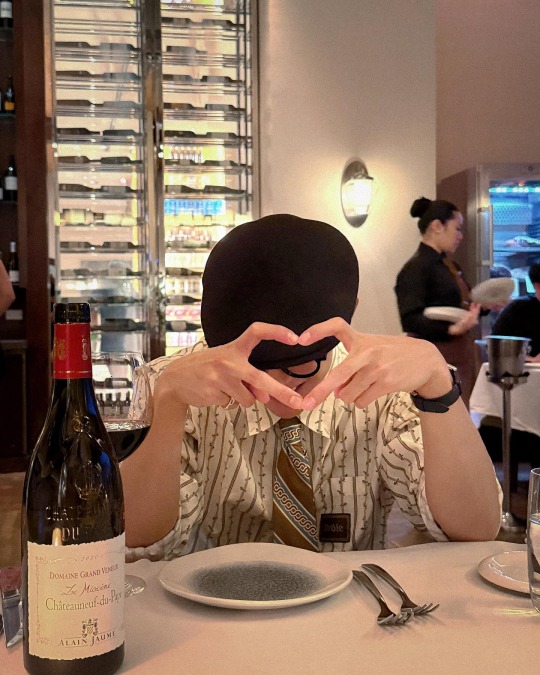

♫ pairing, lee seokmin x reader ♫ warnings, non-idol au, fluff/wholesome, really short (I'm sorry), cute date night setting, shy seokmin for the win!!!!, kind of cliche (if you squint─again, i'm sorry), kissing, lots of giggling ♫ synopsis, a thursday night dinner with your artist boyfriend couldn't be a better date.
♫ author's note, i honestly didn't think school would be battering me this hard, but here we are 😭 doing my best to keep pushing and staying alive, so wish me luck! wanted to write about fluffy domestic boyfriend seokmin because his insta update made me tweak out (in history class mind you) 🧍 anyways please please enjoy! i miss you all lots lyrnation 🤍
♫ now playing, infrunami (steve lacy)
♫ word count, 377 | for @kstrucknet
"the beret is a nice touch, seokmin. i love it on you," you smile into your wine glass, noticing how your boyfriend's cheeks turn red at your compliment.
you and your boyfriend had taken the time this thursday night to go out to a fancy french-inspired dinner, as your schedules had been so packed lately you couldn't even eat dinner together most of the time. seokmin was ecstatic when you proposed the idea to him last week, and he had spent all of his energy looking for the perfect restaurant.
seokmin sipped happily on his wine, cheerful already as his glasses slid down his pointed nose. he giggled as they hit the rim of the wine glass, and you couldn't hold back your chuckle either, cupping seokmin's cheek with your hand as you smile at him.
"hey," seokmin says with a nervous smile, confused as to why you're holding him like that. letting your eyes fall to his soft lips for a split second, you laugh, letting him look at you. "hi, mr. lee."
the light in seokmin's eyes seemed to brighten with your sentence, and he was blushing like a madman, smiling into his napkin as he pulled his beret down further down on his face, trying to cover the spreading blush.
"you know i love it when you call me that." seokmin sighs, voice a low whisper as he eyes you intently. his brown eyes are striking, warm on your glowing skin as you look at him softly. he takes his cold hand, slender fingers cupping your cheek delicately as he rubs his thumb over your skin, inching slowly to your mouth as he then brushes your lip.
"call you what, seokmin?" you play coy, wanting to see how far seokmin will take the light jab. he lets himself go, leaning in as he mouths, "mr. lee." before leaning in and stealing your kiss. you taste wine on his lips, and it's bitter at first, turning sweet seconds after he continues to taste you.
once you pull away, both you and seokmin are more than flustered. even though you're in a busy restaurant, other conversations and moments going on around you two, you're too busy enjoying your own moment─the moment right in front of you.
#kpop seventeen#svt#svt dk#seventeen#kstrucknet#seventeen fic#lee seokmin#seventeen dk#seokmin fic#dokyeom fluff#dokyeom#dokyeom imagines#dokyeom fic#dokyeom x reader#seokmin#seokmin fluff#seokmin imagines#svt dokyeom#svt seokmin#svt x reader#seventeen fanfic#seventeen fluff#sigh#not my best work#but you all deserve it#you deserve SOMETHING from me my god 😭#school is really stressful atm#so still semi-active 😞#but holding out until spring break 🤞#the love for seokmin still goes on
135 notes
·
View notes
Note
yoongi - 50
This one got a way from me a little, but I hope you like it!
#50 People are Staring
Warnings: Swearing, slightly suggestive, mean CEO Yoongi
•••••••••••••••••••••••••••••••••••••••••••••••
You profusely apologized once again for the long wait times even though it wasn’t your fault. It wasn’t your fault that this was one of the only cafes in the city. It wasn’t your fault that this cafe was located right at the entrance level of one of the the biggest and busiest corporate offices in the city, probably the state. It wasn’t your fault that your co-workers all quit or got fired within the last week leaving you with just the new guy, Jungkook.
He was a nice kid and a hard worker, but he was still not familiar with most of the drinks so you had him on the register while you did your best to get the orders done.
You looked at the receipt for the next drink,
Large coffee
2 pumps vanilla
3 pumps peppermint
2 pumps mocha
Almond milk
Whipped cream
Chocolate drizzle
Chocolate cookie crumble
Whatever happened to just coffee with cream and sugar you thought as you began to work on the drink.
Just as you finished up Jungkook came over with a scared look on his face, “Umm Y/N there is a guy at the counter who wants to speak to the manager.”
“Okay, I’ll handle it. Please take this drink for order 377.”, you sighed.
Even though you technically weren’t the manager you were the closest there was right now so you mentally prepared yourself before grabbing a handful of free drink coupons as an apology and heading towards the counter.
You came to a halt feeling your stomach drop at the sight of Min Yoongi. The incredibly handsome incredibly rude super scary CEO of MYG INC. which was located on the top floor of the office building. You’d had several encounters with him. He never smiled, hardly ever looked up from his phone and if he did it was only to make a comment belittling or complaining about something. He stopped by 4 out of 5 days a week but sent his assistant Hobi on the fifth day who was a welcomed break.
You cleared your throat before speaking, “M-Mr.Min, how can I help you?”
He looked down at you through narrowed eyes, “Y/N, I’ve been in line for almost twenty minutes. That is completely unacceptable for a mediocre cup of coffee.”
You nodded with you lips in a tight smile, “Of course sir. I apologize. It’s just Jungkook and I and he is new. We’re trying our best.”
“Yeah well it’s clearly not good enough.”, he scoffed.
You took a deep breath to keep yourself calm, before sliding over the coupons, “Again I apologize Mr.Min. Here are coupons for some free drinks.”
“Ha I don’t need a free drink. Clearly I can afford a $5 coffee which shouldn’t take this long to receive. Do better.”, he spat before grabbing his coffee from the counter and heading towards the elevators.
“Wow he’s an intimidating asshole.”, Jungkook whispered next to you.
“Yeah uh he’s something for sure.”, you sniffled trying to hold back some tears.
Over the next couple weeks things improved slightly. Jungkook was getting quicker and the owner hired two more employees, Jimin and Taehyung.
Your classes had started up again so you were moved to the evening shift which you were so thankful for. It was a little slower and you no longer had to deal with Yoongi.
Clocking in for your shift you got a text from the owner,
Jin (Boss man): Hey there’s a new guy starting tonight. He’s only working a few hours a week. Something about learning to deal with people blah blah blah. Please show him the ropes.
You: Sure thing
JIN (Boss man): He’s really handsome by the way. NO OFFICE SEX!!!
You chuckled as you tucked away your phone ready to get this shift over. The first couple hours flew by even though it was relatively slow. You had your back turned to the counter as you scrubbed away at one of the machines.
From behind you someone cleared their throat making you jump.
If you had a million guesses you never would’ve been correct about who was standing behind you in uniform.
“Uh Mr. Min?”, you questioned.
He looked more pissed off than ever.
“Y/N, I guess I am your new coworker for the next several weeks. Maybe I’ll be able to to come up with a better system to solve the slow service around here.”
“Umm uh sir? W-what do you mean coworker?”
He rolled his eyes, “Obviously I mean we are working together.”
“I know what a coworker is. My question is why is a billionaire ceo working at a coffee shop for minimum wage?”
“Because my lovely parents think I need to learn some humility and how to talk to people other than just demanding things. They said I do this or they’re removing me from the company so I have no choice.”, he said picking at some lint on his shirt.
“So I’m working here a few hours a week. I figured if anyone knows some humbleness it’s a nobody coffee maker.”
Great. Just great. Just when you thought things were looking up now you have to deal with this arrogance and rudeness.
But being the reliable hard worker you are you sucked it up, “Okay sir. The easiest thing is to learn the register first.”
He followed you over to where the computer was located.
“Okay so this row is the specials. This row is basic coffees. Then when you select a coffee it asks if you want to add any thing. That’s where you’ll find the flavorings and toppings. This row is cold drinks. This row is baked good.”
You noticed he was very quiet so when you looked up you weren’t surprised to see him staring at some blond in a short pencil skirt sitting at one of the cafe tables.
“Are you even listening?”, you questioned.
“Y/N, I run a billion dollar company. I think I can figure out a few buttons on a computer screen at a coffee shop.”, he smirked.
“Okay sir, here’s your first customer.”, you smiled as an older woman came up to the register.
“Hi, welcome to Jin’s Java House, how can I help you?”, he greeted her.
“Sure can I get a medium coffee with two pumps of hazelnut, half a pump of vanilla but make sure it’s only half a pump. Last time they definitely put too much. Then also add a caramel swirl and use half oat milk half almond milk that is warmed up so it doesn’t cool the coffee too much. I also want a banana nut muffin on the side but warm it up also.”
You felt a deep happiness as you watched Yoongi’s fingers hover over the buttons unsure of how to complete the order. Reluctantly he looked at you for assistance.
You showed him how to type in the order while Jimin got to work making it.
That was definitely a humbling experience for Yoongi who was much more open to help after that.
Working at the coffee shop certainly seemed to bring a change in Yoongi. He was friendlier, calmer. One night he even apologized for always treating you so coldly, especially that one day he made you cry. He said he came down later in the day to apologize then but you were already gone and it bothered him ever since. The two of you became a lot closer and you might’ve started to developed a small crush instead of just pure hatred for him.
You were most surprised when he agreed to work with you during a Saturday morning shift. It was a last resort when you texted him explaining the situation and that you were going to be working by yourself. When he showed up Saturday morning bright and early you were in shock. He looked even hotter than usual in his ripped jeans and sneakers and the cafe shirt. His hair just combed through and messy instead of styled back. He wore glasses instead of his usual contacts. He looked good as he greeted you with a gummy smile.
The shift was BUSY. You felt like you were running around nonstop. Yoongi even broke a sweat which you didn’t think was possible.
“I have to go in the back and get more ice water. The machine is overheating again.”, you said pointing at the old espresso maker.
“I’m just going to suck it up and buy Jin a new one. That cheap bastard. This is ridiculous.”, he shook his head.
The bucket was heavy as you did your best to carry it up front without spilling any.
“Hey Y/N, how do I ring up a strawberry milk tea aga-“
Before he could finish Yoongi turned around and crashed into you spilling the ice water all over you and the black coffee he was holding all over himself.
You hissed from the coldness running down your body.
“Oh my god I am so sorry Y/N. I didn’t see yo-“
Yoongi stopped speaking rendered silent.
He came to stand in front of you when you noticed the coffee spilled all over his jeans and shoes, “Oh sir I am so sorry. I didn’t even notice. I can’t afford to buy you new ones but I’ll try to clean them the best I can.”
You noticed the waiting area full of customers all staring at you. Mostly in silence, a few chuckles. Your cheeks started heating back up even though your body was cold from the water.
“People are staring.”, you whispered.
“Um yeah uh. Probably because um…”
You’d never seen the CEO so flustered. A blush crept up his next to his cheeks before he continued, “It’s probably because your shirt is uh…is kind of see through right now.”
You looked down in horror realizing that the water had turned your white work shirt completely see through revealing your white lace bra underneath.
You ran in the back looking for another shirt to change into when Yoongi followed close behind.
“I’m so embarrassed. I’m so sorry sir. I’m sorry about your clothes and I’m sorry I embarrassed myself in front of you and now you’re never going to like someone like me and ugh I’m so dumb. Why didn’t I wear an apron today?”, you were rambling on and not even realizing what you’d said when Yoongi came and stood in front of you again handing you a shirt he had found, “Y/N, you have to stop calling me sir. Please. Especially when you’re standing in front of me with your bra on display.”
“Um sir…I mean Mr.Min I…It’s a habit.”, you said even more embarrassed.
“Mr. Min isn’t any better.”, he shook his head.
“Here put this shirt on and then let’s go out there and finish this shift so we can go back to my place, have dinner, and then I can see this lace on full display while I make you call me sir in all kinds of ways.”, he said with a smirk just inches away from your face, “Otherwise I might just have to take you here. And Jin is going to be very upset that we broke the no office sex rule.” Your eyes widened with excitement as you quickly changed before following after him reeling with desire.
#bts#yoongi fanfic#yoongi x reader#min yoongi#bts x reader#bts fanfic#yoongi x y/n#yoongi fic#yoongi au#ceo Yoongi#bts yoongi#yoongi angst#yoongi fluff#yoongi
101 notes
·
View notes
Text
So how exactly are Britain's railways run?
Ever since British Rail was privatized (considered by many to be amongst the worst decisions ever by the British government) the railways in Britain have become a confusing mess of different companies and organizations with different, often overlapping responsibilities. We now present a simplified explanation of the structure of Britain's railroads since privatization, with some information on how things may change now the railroads are set to be renationalized.

Looking at the above picture, what do you think seems like a reasonable way to delegate the various parts of running a railroad?
Well, according to the European Union, it is into an infrastructure organization responsible for tracks, signals, and so forth; and train operator(s), responsible for running train services. You may have different ideas on how best to do this, but this method seems fairly reasonable and not too complicated, right? Now, British Rail was privatized when we were still in the EU, and it was several years after Brexit when it was decided to renationalize the railroads under Great British Railways. Bearing this in mind, here is how the british railroads worked from privatization, and how they're probably going to work after renationalization.
TRAIN SERVICES: Train services are provided by the train operating companies (TOC's). There are several types of train operating companies, all run differently. Also, we're only talking about normal passenger operations, not heritage routes or freight because those work differently.
Franchised operators: different companies (often other countries' state-owned railroads) bid to run groups of services (franchises), with the franchise given to whichever one says they'll make the most money or need the least subsidies. The companies then have to do that, and if they don't make as much money as they agreed they would, they get replaced. Except this system broke during the pandemic, since it was pretty obvious no train operator was going to make enough money, and every operator's contract was just extended indefinitely. In the above picture, the operator is Govia Thameslink Railway, although they use different branding for their routes, and so this operator is Southern.
Operators of last resort: a private TOC broke its contract or otherwise messed up badly enough that the government stepped in and renationalized that service (as a last resort, of course). These services are run by either the Department for Transport or by the Scottish or Welsh government. There's quite a lot of them, since it turns out the companies bidding for franchises often had extremely unrealistic ideas of how much money they'd make, and were also quite bad at running services. Southern, despite being among the worst-ranked TOC's for passenger satisfaction, has been operated by the same company since 2001.
Open-access operators: a private company thinks it can make some money running trains, so they lease some trains, pay for track access, and then do that.
Under Great British Railways, once all of the private companies' contracts expire, they'll be run by the government as a part of GBR. The operators of last resort will continue to be owned by the government, and the open-access operators will be left alone.
TRAINS: The trains themselves are not owned by the TOC's, they are owned by the Rolling Stock Operating Companies (or ROSCO's), which then lease them out to the TOC's. In the above photo is a Class 377 leased by Southern and owned by Porterbrook. One issue here is that the open-access operators are competing with the other TOC's for use of the trains, which causes problems with the availability of rolling stock. The ROSCOs don't really add anything to the railways, and as far as we know there are no plans to renationalize them.
INFRASTRUCTURE: The right-of-way, tracks, signals, bridges, tunnels, and so on, are owned, upgraded, and maintained by Network Rail (although sometimes these are contracted out). We're a government body (exactly what sort we aren't sure) and aren't expected to make money. This wasn't always the case, since initially a private company (Railtrack) did everything we do, but they did such a terrible job that they caused several fatal derailments, and were renationalized to be replaced by us. Once GBR is established, we're going to be merged into it (the EU can't stop us anymore, we can have the trains and tracks run by the same organization! that's what brexit was for, right?)
STATIONS: All stations in the country are owned by Network Rail. However, we don't actually manage most of them, and instead one of the TOC's does (usually one that services that station, but not always). We do manage the biggest stations, such as the various London terminals and Birmingham New Street. As mentioned before, that'll become GBR's job once it exists.
There, now you should understand how Britain's railways work (until renationalization anyway). Except for freight services. And TfL's network. And the various other metro, light rail, and tram services around the country. But that's good enough. Now use your knowledge to know who to blame when your train is delayed (hint: it's never Network Rail. Unrelated, whoever's responsible for delays has to pay the passengers compensation.)
7 notes
·
View notes
Text







Round 2 soon!
23 notes
·
View notes
Text
The Southern Railway


Hello everyone, @network-rail here. I created this blog because @northern-fail mentioned that there weren't any southern railroad blogs to have a rivalry with (see here for context). The whole point of this blog is to have an friendly rivalry with the railways up north, I don't really have any other plans for it. Once renationalization happens I might change it to Network SouthEast to reflect the change (or possibly something else if we get a new southern region).
This is based on the original Southern Railway, one of the "Big Four" that operated in Britain from the 1923 grouping until nationalization in 1948. The Southern Railway built what was at the time one of the world's largest electric railway networks, using 750V DC third rail, which is why the southeast of Britain still uses that instead of 25kV AC overhead.
If you're looking for the modern-day company run by Govia Thameslink Railway that goes by the name of Southern and uses a lot of the original Southern's branding, then you can stay only if you name at least two british trains that aren't Class 377s.
If you're looking for the american Southern Railway (which is older than the British one, funnily enough) that is now a part of Norfolk Southern (Safety Fourth!) then you can stay only if you sing the entirety of "Union Dixie."
16 notes
·
View notes
Video
Loc talk por Alexander Dülks Por Flickr: Railway enthusiasts talk tech at the railway museum in Bochum-Dahlhausen. Rainwater has given the locomotives a shiny surface. From left to right: DR series 44 Numbering: 044 377 (ex 44 1377 ÜK) Manufacturer: Krupp Year of construction: 1942 Retirement: 1977 "The locomotives of the series 44 of the Deutsche Reichsbahn were heavy, five-coupled goods train standard steam locomotives of the class G 56.20 with triple engine. They were intended for the transport of goods trains up to 1,200 tons on low mountain ranges and 600 tons over steep ramps. [...]" (Translated from German Wikipedia entry) DB series V 200.0 Numbering: V 200 017 Manufacturer: MaK - Maschinenbau Kiel Year of construction: 1957 Retirement: 1983 "The class V 200.0 [...] was one of the first diesel mainline locomotives of the Deutsche Bundesbahn (DB). Its striking appearance corresponded to the typical industrial design of the 1950s. [... ] The V 200 transported high-quality express trains on all important main routes. Due to the progressing electrification, however, the machines were pushed out of these services and increasingly used in front of local trains and freight trains. [...]" (Translated from German Wikipedia entry) Hibernia 41-E (Henschel "Bochum type") Numbering: Hibernia 41-E Manufacturer: Henschel Year of construction: 1942 Retirement: 1972 "The Hibernia 41-E and 42-E were steam locomotives from Hibernia AG. While the locomotive 42-E was scrapped, the 41-E is preserved in the inventory of the Bochum-Dahlhausen Railway Museum. It stood in 1988 and from 2000 to 2015 as a Monument and eye-catcher in front of the Starlight Express Theatre in Bochum. [...]" (Translated from German Wikipedia entry)
7 notes
·
View notes
Video
Long Live the 118 by Joe McMillan Via Flickr: I think the best end-cab switcher paint scheme was applied to two groups of T&NO EMD SW-1200 switchers. The first group, numbers 113-118, arrived in February 1954, followed by the second group, 123-128, in February-March 1957. These 12 units were classed as road units and featured classification lights, train number indicators, MU connections, in-cab speed recorders, and silver-painted ends. The first duty assignment for most of these engines was replacing steam power on Texas and Louisiana branch lines.
In this photo, taken in February 1954, 70 years ago, SW-1200 118 has just arrived on the property and is the sole power on train 377, which ran from Yoakum to Kenedy, Texas, returning as Train No. 378. The first run with the 118 on this local freight was on February 24. 1954. The 118 stayed around briefly before being replaced by other SW-1200s and eventually by Alco switchers.
This locomotive underwent number changes, rebuildings, and repaintings while on the Southern Pacific roster. Still running after 70 years, this unit now operates on the Moscow, Camden & St Augustine short line in East Texas. It is immaculately maintained on the MC&SA and sees daily service.
Photo by Joe McMillan, February 1954, at Yorktown, Texas, while the crew was loading horses into two stock cars. The branch line through Yorktown was abandoned in 1972.
24 notes
·
View notes
Text
In class Activity
Jay had started his story from his own life story. He used very attractive, funny, relatable and talkative language as well as he used many examples.
Yes, His speech had a complete structure. As an introduction, he had used his own story. For the body and conclusion parts, he used several examples and the way successful as an entrepreneur.
Effectively used his voice while he speaking he controll his voice properly. He used his body language clearly, using gestures to grab the audience's attention.
Yes, He inspired the audience by addressing common challengers, providing motivations. Give proper solutions for their problems, current world trends, how should be an allrounder as an entrepreneur and how to be goal oriented.
Group Members
BM/2022/299 - Wathsala
BM/2022/382- Prabodhya
BM/2022/441- Chanuli
BM/2022/377-Heshani
BM/2022/171- Kavishka
BM/2022/325-Haresha
3 notes
·
View notes
Text
377. Various Authors - Dragon #96 (April 1985)

Welcome to April '85, a pretty short month for the standards of the mid-80s in terms of publications, but we do get an adventure module, a whole new novel and a couple of magazines, so we'll start off with that and April's Dragon Magazine. As it is a kind of on and off tradition, the April issue celebrates April Fools and there will be a humorous component to the magazine (except in the years in which they forgot).

This year they didn't forget to make the April issue the "funny one", as we can tell that immediately from the whimsical cover by Jack Crane, the go-to artist for funny covers for Dragon, now that Phil Foglio has gone on to do other things. In the contents page you also see some shenanigans going on with an editor column which is mirrored, but your faithful correspondent did flip the image to read it and it's basically a long diatribe about how no one reads the editor's letter and Kim Mohan gets no correspondence and he's really sad about it, so he is going to quit writing them. All lies, of course.

Some of the content is humorous, and you get spoof reader's mail, the "Hopeless" character class, a funny adventure module for really high-level characters which is just a spoof of godlike "Monty Haul" PCs. You also get a little tribute to the aforementioned Phil Foglio with stats for a What's New Dragon monster. On the more serious side of things, you get Gygax with new official rulings for Demi-Human classes... you can finally have a Dwarven Cleric or an Elven Ranger... What a concept!

10 notes
·
View notes
Text
40 – Depressão – O mal do século
Por Morganna la Belle
Psicanalista

I – Introdução
Este trabalho tem como finalidade abordar, de forma simplificada, o transtorno mental conhecido como depressão.
Trata-se de um mal que já atingiu escala global. Segundo dados da OMS, até 2030 deverá ser a doença mais comum no mundo e a que mais incapacitará para o trabalho. Também já foi comprovado que um terço dos pacientes não respondem aos tratamentos convencionais e que medicamentos contra depressão costumam causar dependência psicológica.
O Manual Diagnóstico e Estatístico de Transtornos Mentais (DSM-5), traz mais de 300 transtornos mentais identificados e catalogados. No entanto, segundo estatísticas, o distúrbio mental conhecido como depressão figura entre os que mais acometem as pessoas e causam danos ao psiquismo, já ficando comprovado que é também a maior causa de suicídio no mundo.
Considerando ainda o número crescente de pessoas que sofrem dessa espécie de patologia, tal doença foi considerada, no século passado e também no atual, como o mal do século.
II – Breve histórico da depressão
A palavra “depressão” vem do latim depressio, do verbo deprimere, que significa pressionar ou prensar para baixo.
No século IV a.C. Hipócrates (460 a.C.-377 a.C.) estabeleceu a teoria dos humores e delimitou os conceitos de sangue, fleuma, bílis branca e bílis negra. O desequilíbrio entre tais humores causaria a doença. Etimologicamente, a palavra melancolia se define como a junção das palavras gregas melas (negra) e kholé (bílis).
Aristóteles, em sua obra Problema XXX, I, definiu a melancolia como uma perturbação da alma, que afetava os homens de exceção tais como os gênios, os poetas, os filósofos, os artistas.
A melancolia pode ser poeticamente considerada um ancestral remoto da depressão, porém não são a mesma psicopatologia.
Segundo Christian Dunker, em Uma Biografia da Depressão, edição de 2021, na Idade Média surgiu outro tipo de patologia parecida, que recebeu o nome de accidia (acedia, em português), mal que acometia religiosos nos mosteiros cristãos medievais, que consistia em um desânimo profundo com as coisas sagradas e perda da fé religiosa. Tal sofrimento psíquico era considerado na época como sendo um mal de natureza espiritual. Não por acaso tal mal, assim como várias doenças mentais na época, acabou sendo associado ao demônio e suas artimanhas para desviar as pessoas do caminho de Deus. E, na época que ficou conhecida como idade das trevas, as consequências só poderiam ser duas: Exorcismo ou purificação através da morte pelo fogo. Então muitas pessoas, em sua maioria mulheres e pertencentes às classes mais baixas, foram queimadas vivas.
Entre os séculos XIV e XVI, que marcou a transição da Idade Média para a Idade Moderna, nasceu o movimento cultural conhecido como Renascimento. Neste período, a melancolia voltou a ser compreendida como um sentimento positivo, característico de artistas e intelectuais.
Porém, com o advento do Racionalismo entre os séculos XVI e XIX, a melancolia voltou a ser vista como algo nocivo, incompatível com a ideia de que através da razão podia se chegar ao conhecimento, inclusive de como ter uma vida mais feliz.
Mas o movimento estético e cultural conhecido como Romantismo, que nasceu nas últimas décadas do século XVIII, associava a melancolia à beleza e à nobreza de caráter do ser humano.
Importante ressaltar que, até os estudos Philippe Pinel (1745-1826), o acometimento da melancolia estava associado também às estações do ano. Pinel assinalou então que tal patologia estava na verdade relacionada à constituição da pessoa e não a este ou àquele período do ano, como até então se acreditava. Este foi o começo da abordagem psiquiátrica a respeito de doenças mentais.
Ainda de acordo com Dunker, o popular dicionário francês Nouveau Petit Le Robert, do lexicógrafo Paul Robert, registra que o nascimento da palavra depressão como sinônimo de sofrimento psíquico remonta ao ano de 1851.
Em 1854, o psiquiatra Jean-Pierre Falret (1794-1870), com o fim de diferenciar a fase de euforia da fase de momentos de profunda tristeza existentes na loucura circular, empregou o termo depressão. A partir desta fase a depressão foi ganhando expressão acadêmica e médica, diferenciando-se progressivamente da melancolia.
O século XIX (1801 – 1900) ficou, não por acaso, conhecido como o século dos manicômios. Data desse período histórico a proliferação de hospícios onde pessoas eram internadas, muitas vezes compulsoriamente, por apresentarem algum distúrbio mental. Foi também nessa época que o alienismo, como era conhecia a psiquiatria em seus primórdios, começou a impor a teoria de que a depressão e patologias correlatas se tratavam na verdade de doenças do corpo, mais especificamente do cérebro.

A depressão sempre foi uma doença cercada de preconceitos.
Ainda sobre a desvinculação da depressão de melancolia, foi reconhecida a contribuição de Melanie Klein (1882-1960), psicanalista vienense, no sentido de dar maior visibilidade e autonomia ao transtorno mental da depressão.
Incontestável, outrossim, a importância de Sigmund Freud, pai da psicanálise que, através de sua obra Luto e Melancolia em 1917, detalhou as diferenças entre a melancolia e o luto, contribuindo para que a melancolia fosse melhor caracterizada, fazendo com que posteriormente fosse fundamentadamente também dissociada da depressão.
O ano de 1952 ficou marcado como o ano em que a depressão foi catalogada no primeiro DSM – Diagnostic and Statistical Manual of Mental Disorders, com a expressão “reação depressiva”, associada a outras desordens mentais. Posteriormente, com as novas descobertas de medicamentos tais como a penicilina, o cloreto de lítio, a hidrazina, os benzodiazepínicos e os antidepressivos de terceira geração, assim como outros que atuavam de forma secundária como anti-hipertensivos e também os neurolépticos que combatiam outras patologias correlatas, a depressão foi então ganhando cada vez mais notoriedade.
Em 1980, através do DSM-IV, a depressão foi catalogada de forma específica, como sendo uma forma de transtorno de humor. E como se verificou que tal transtorno abrangia mais de uma forma, ela foi então subdividida em onze tipos, sendo eles:
1 – Distimia (transtorno depressivo persistente);
2 – Transtorno disruptivo da desregulação de humor;
3 – Transtorno disfórico menstrual;
4 – Transtorno depressivo induzido por substância ou medicação;
5 – Depressão sazonal;
6 – Depressão secundária;
7 – Depressão endógena;
8 – Depressão atípica;
9 – Transtorno depressivo maior (transtorno bipolar tipo I);
10 – Depressão bipolar (transtorno bipolar II e III, transtorno ciclotímico) e
11 – Depressão psicótica.
No entanto, existem outras subclassificações mais genéricas utilizadas quando o paciente não se enquadrar em nenhuma das acima, tais como o transtorno depressivo não especificado.

Mais especificamente foi com a descoberta dos antidepressivos denominados atípicos que atuam sobre a dopamina, serotonina e epinefrina que a depressão realmente pôde se destacar como doença digna de atenção.
Os neurotransmissores, mensageiros químicos do cérebro, foram então evidenciados e supervalorizados, sendo que a atuação alopática sobre eles faria com que a depressão pudesse ser curada ou pelo menos controlada.
Isso, de par com a releitura da depressão a partir de 2008, como sendo uma doença que atua também sobre o corpo através de sintomas físicos, fez com que a medicina se evidenciasse ainda mais como a única ciência capaz de curar tal patologia.
Passou-se então a acreditar que seria dispensável a atuação de profissionais tais como psicólogos e outros psicoterapeutas na guerra contra o mal do século. O tratamento químico resolveria o problema, sem a necessidade de se verificar qual a causa da patologia, sendo que tal demonstração de irracionalidade continua ainda a ser aplicada até os dias de hoje com fins de enriquecer ainda mais a indústria farmacêutica, sendo minimizados e mascarados os danos físicos causados aos pacientes.

Medicamentos contra depressão não são isentos de efeitos colaterais
III – Conceito simplificado de melancolia, luto, acedia e depressão
. Melancolia
Estado de tristeza profunda, identificado por Aristóteles na Grécia antiga, com base na teoria dos humores de Hipócrates. Era vista como um sentimento característico dos chamados homens de exceção, ou seja, pessoas de intelecto diferenciado, capacidade artística e alta sensibilidade. Por causa da sua sentimentalidade questionavam e sofriam pelos males inexplicáveis do mundo.
Com base nas teorias de Freud, trata-se de uma psiconeurose narcísica, onde há um conflito entre o ego e o superego.
Foi reconhecida como patologia, fundada em um tipo de sofrimento psíquico.
. Luto
Processo em que ocorre a retirada do investimento libidinal que havia sobre um objeto específico, em razão da perda do mesmo. Tal objeto, no entanto, pode ser identificado, não se tratando de algo inconsciente. Como exemplo mais comum, a perda de uma pessoa amada em razão da morte.
Freud afirmou que, após a conclusão do processo de luto, o ego fica livre outra vez e a energia libidinal pode ser canalizada para outro objeto.
. Acedia ou accidia
Sentimento de desânimo profundo e perda da fé religiosa, que acometia religiosos no período da Idade Média.
. Depressão
Termo médico originado da psiquiatria, no século XVIII.
Trata-se de um processo de exacerbação e prorrogação da reação a uma perda.
A depressão é identificada pela psiquiatria com sendo uma doença causada pelo deficit de certas substâncias no cérebro.
A Psicanálise vê a depressão como um mal-estar ligado à própria condição efêmera do ser humano, podendo também ser parte de outras estruturas patológicas. De acordo com a hipótese psicanalítica, ocorre um conflito entre o ego e o ideal do ego. O deprimido sofre por não conseguir atingir aquilo que se considera ser o ideal de ser humano, com base nos convencionalismos sociais predominantes em determinada cultura e época.
Na corrente psicanalítica, admite-se que o deprimido vive um desacordo relacionado a si mesmo, aos outros e ao próprio desejo, sendo que as causas deste conflito só poderão ser conhecidas através dos processos psicanalíticos de trazer ao consciente aquilo que está reprimido ou recalcado.
A corrente pós-freudiana ligada a Lacan postula que a depressão é uma covardia moral do sujeito, sendo o fenômeno depressivo um movimento de recusa ao desejo.

A Psicologia e a Psicanálise são poderosas aliadas da Psiquiatria no combate à depressão.
IV – Causas da depressão
As causas da depressão continuam a ser objeto de estudo pelas psiquiatria, psicologia e ciências afins sem que se tenha chegado ainda a uma definição muito precisa a respeito delas.
Há ainda muita discussão entre os estudiosos que defendem as causas puramente biológicas e aqueles que defendem que tudo se inicia na mente para só depois provocar mudanças neurofisiológicas.
Controvérsias à parte, há vários fatores que concorrem para que um quadro depressivo se estabeleça em uma pessoa. Leve-se em conta ainda que algumas formas de tristeza ou quadros depressivos são na verdade sintomas de outras doenças, tais como a síndrome de Burnout, a bipolaridade e outros transtornos de ansiedade.
Sabe-se, no entanto, que a depressão pode ser desencadeada através do que se chama de “gatilho”. Como exemplo, podemos citar um fato traumático na vida da pessoa, tal como a perda de um ente querido ou mesmo mudanças inesperadas de cidade, estado ou país.
Christian Dunker, em obra já citada, assinala como causas da depressão o deficit de certas substâncias no cérebro, uma existência vazia e sem sentido, causas envolvendo a transmissão do impulso neuronal, a genética, causas ambientais tais como a baixa luminosidade do sol, a alimentação e um conjunto de experiências psíquicas que variam de caso a caso.
A Psicanálise oferece a sua contribuição no sentido de compreender e controlar a depressão, sendo que no geral busca entender a motivação e não combater diretamente seus sintomas. Isso porque fazendo cessar as causas, faz naturalmente cessar também os efeitos.
Para fins didáticos e de síntese, podemos classificar os fatores causadores da depressão como psicossociais, biológicos, físicos e outros não especificados.
Vejamos então cada um deles.
Fatores psicossociais
São fatores ligados a mudanças contingenciais ou definitivas na vida da pessoa, mudanças estas normalmente acompanhadas de alguma privação ou de algum tipo de sofrimento.
A perda de um ente querido é muitas vezes o acontecimento inicial que faz desencadear um quadro depressivo.
Também mudança de cidade, estado ou país podem fazer com que o sujeito passe a se sentir deslocado e longe dos amigos e muitas vezes também da família. Em tais casos costuma ocorrer uma recusa ou bloqueio de aceitação quanto à nova realidade, fazendo com que o quadro depressivo se apresente.
Conflitos no trabalho são, outrossim, grandes causadores de depressão. Mudanças abruptas tais como transferências, rebaixamentos, mudanças de função, assédio moral, assédio sexual etc. podem ser o gatilho para que se desencadeie a doença. Esse tipo de específico de depressão pode, além disso, estar ligada à síndrome de Burnout.
Se quiser saber mais sobre a síndrome de Burnout acesse
Finalmente, mas não esgotando o tema, punições em geral, infligidas pelos pais, sacerdotes, patrões e outras pessoas investidas em algum tipo de autoridade sobre o deprimido, também podem ser o fator precipitante da doença.
Fatores biológicos
São fatores relacionados a alterações nos neurotransmissores, os mensageiros químicos que transportam, estimulam e equilibram os sinais entre os neurônios. Para fins de estudo da depressão, interessam mais os neurotransmissores serotonina, acetilcolina, dopamina, adrenalina e noradrenalina.
Também desequilíbrios hormonais podem estar ligados a um quadro depressivo.
Considere-se ainda atrofias ou mesmo lesões em partes do cérebro, mais especificamente no lobo pré-frontal, área responsável pela elaboração do pensamento e planejamento, ligada portanto às funções executivas.
Fatores físicos ou traumatismos
Estudos já comprovaram a ligação entre traumas físicos, sistema nervoso e emoção. As células possuem uma espécie de memória, que armazena as sensações de acontecimentos bons ou ruins no decorrer da vida.
Acontecimentos tais como acidentes físicos registram no corpo, no emocional e no sistema nervoso sensações diversas e interligadas que são desencadeadas novamente, em maior ou menor grau, caso seja repetida ou mesmo simulada as condições que as provocaram.
Sendo assim, caso o evento físico traumático tenha feito desencadear um quadro depressivo, tal condição continuará subsistindo em sintonia com as possíveis sequelas físicas que o acidente provocou. Assim, conclui-se que a mente e o sistema nervoso devem ser tratados ao mesmo tempo em que se trata também do corpo físico. Para tanto, seria altamente recomendável terapias mais completas direcionadas ao tratamento de distúrbios somato-emocionais, ou seja, das doenças que produzem efeitos tanto no corpo quando na mente, buscando então o reequilíbrio somato-emocional (RSE).
Outros fatores
Como exemplo de fatores outros que não foram enquadrados nas classes acima, podemos citar:
. O uso ou mesmo a retirada de medicamentos tais como betabloqueadores, benzodiazepínicos, corticosteroides, anti-histamínicos, analgésicos e antiparkinsonianos.
. A exposição a certos defensivos agrícolas ou agrotóxicos, como os organofosforados.
. A drogadição. Por exemplo, o uso da cocaína.
. Predisposição genética, no sentido de provocar ou mesmo intensificar quadros depressivos.
. Constante baixa luminosidade do sol, como ocorre em países nórdicos.
. Ocorrências traumáticas ao longo da vida.
V – Sintomas da depressão
Existem diferentes tipos e graus de depressão, sendo que apenas um profissional da área médica e psicológica pode situar o paciente neste ou naquele quadro.
Alguns sintomas, no entanto, são bem comuns a todos os tipos. Porém, repita-se que apenas um profissional está apto a avaliar se o caso é mesmo de depressão ou outra patologia.
As reações químicas que se verificou ocorrer no cérebro envolvendo os neurotransmissores foram detectadas como sendo deficit na receptação de serotonina, dopamina, adrenalina e noradrenalina, o que faz com que ocorram sintomas específicos envolvendo o corpo, o humor, a libido e etc.
Vamos, para fins didáticos, classificar os sintomas da depressão em cognitivos, fisiológicos e comportamentais.
Vejamos então os sintomas:
Cognitivos
. Humor deprimido: desânimo persistente, tristeza, baixa autoestima, sentimentos de inutilidade, vazio, culpa e/ou irritabilidade;
. Redução da capacidade de experimentar prazer na maior parte das atividades, antes consideradas como agradáveis;
. Diminuição da capacidade de pensar, de se concentrar, memorizar ou de tomar decisões;
. Ideação suicida.
Fisiológicos
. Fadiga ou sensação de perda de energia;
. Alterações do sono (mais frequentemente insônia, podendo ocorrer também sonolência excessiva ou sono interrompido);
. Alterações do apetite (mais comumente perda do apetite, podendo ocorrer também aumento);
. Redução do interesse e prazer sexual;
. Agitação motora, inquietude;
. Alterações dos ritmos circadianos (dormir fora de hora).
Comportamentais
. Retraimento social (isolamento social);
. Chorar mais e com mais frequência;
. Comportamentos suicidas;
. Retardo psicomotor e identificação generalizada, ou agitação psicomotora;
. Tentativa de suicídio;
. Comportamento autodestrutivo (automutilação).
VI – Tratamento holístico para o mal do século
Passemos então a abordar formas de tratamento da depressão, com base em métodos preventivos, psiquiátricos e psicológicos.
A – Tratamento preventivo
Como diz o antigo ditado, é melhor prevenir do que remediar.
Precisamos nos conscientizar da importância de atos e hábitos preventivos, no sentido de evitar qualquer patologia. No entanto, se a doença se instalar, é necessária uma participação mais ativa do paciente no próprio tratamento. E isso é justamente o que não se verifica em pessoas deprimidas que, em casos mais graves, encontram dificuldade até mesmo para se levantar da cama. Mas mesmo assim, se não podemos fazer o mais, então que façamos o mínimo que estamos podendo para que possamos alcançar o próximo nível em direção à cura.
Proponho uma lista não exaustiva de práticas e hábitos saudáveis que, se efetivados, podem evitar ou ajudar a tratar não só a depressão mas também diversas outras doenças.
Vamos a ela:
. Mudar hábitos mentais
Aprender a importância de, quando necessário, mudar o nosso ponto de vista e ter uma perspectiva mais positiva em relação às coisas.
Ter a consciência de que a tristeza faz parte da vida, é um sentimento com o qual teremos que lidar em várias fases de toda a nossa existência, normalmente acompanhando situações de perdas e mudanças traumáticas, como o falecimento de um ente querido. No entanto, a vida nos traz momentos felizes também e devemos vivê-los com intensidade.
. Mudar de ambiente e abandonar relaçõesnocivas
É importante descobrir se a causa da patologia é mais interna ou se o ambiente também provocou a instalação ou o agravamento da mesma. Procurar então aprender a lidar com pessoas e ambientes da melhor maneira possível, visando antes de tudo a própria saúde mental.
Isso significa direcionar nossa vida no sentido evitar ambientes tóxicos e abandonar relacionamentos destrutivos.
. Não seguir comportamentos de massa
É necessária uma releitura da realidade em que hoje vivemos.
É muito saudável não permitir sermos controlados pela sociedade da felicidade compulsória, pela cultura do narcisismo, pelos hábitos da modernidade líquida descrita por Zygmunt Baumant.
É muito importante entender que a propaganda que incentiva o consumismo e o controle da nossa subjetividade quer apenas vender o que muitas vezes não precisamos, tendo ainda a pretensão de definir a nossa própria identidade. E as redes sociais dão seguimento a esse controle nefasto, incentivando a ostentação de uma vida feliz e perfeita, mas feita de aparências, causando ao final a sensação de um grande vazio interior.
Sobre não se tornar mais uma vítima das mentiras divulgadas todos os dias na internet, leia um breve texto acessando
Devemos, portanto, ter um caráter firme o suficiente para não seguirmos uma mente coletiva destrutiva que nos fará, ao final, perdermos a nossa própria individualidade.
. Aprender a conciliar trabalho e lazer
O lazer é sim, tão importante quanto o trabalho.
Não devemos viver apenas para trabalhar, mas também para usufruir dos frutos do nosso próprio trabalho.
. Ter amigos verdadeiros
Amigos verdadeiros vibram de felicidade com as nossas conquistas, mas não nos apoiam quando percebem que vamos cometer erros. É muito difícil caminhar nesta vida sem amigos verdadeiros.

. Desenvolver os talentos naturais
Se trabalhamos com ciências exatas para viver, mas gostamos de desenhar, pintar, cantar ou escrever poemas, por que não fazê-lo? Nossos dons e talentos naturais devem sim ser desenvolvidos para que tenhamos um desenvolvimento humano mais integral e uma vida mais plena.
. Ter uma alimentação de qualidade
A idade chega pelas pernas e a doença entra pela boca.
O quanto de carne, enlatados, fast food e bebidas alcoólicas precisamos para viver? Ter que fazer dieta depois que a doença se instala no organismo é muito, muito mais sofrido, lembremo-nos disso.
. Fazer check-up anualmente
Além dos chamados exames de rotina, devemos também ter uma atenção especial quanto às taxas hormonais, principalmente quando a idade for avançando. Relembre-se que, como exposto acima, muitas pessoas deprimidas apresentam também desequilíbrio hormonal.
. Praticar atividades físicas prazerosas
De novo: A idade chega pelas pernas e a doença entra pela boca.
Quando uma pessoa começa a apresentar muita dificuldade em subir escadas ou rampas, agachar, ou mesmo a fazer uma caminhada um pouco mais longa, está mais do que na hora de avaliar o condicionamento físico.
De par com isso, sabe-se que a prática de exercícios físicos promove a liberação de endorfina no organismo. A endorfina é o hormônio da felicidade, prazer e bem-estar, sendo que isso é um poderoso aliado contra o stress, tristeza, ansiedade e irritabilidade, sintomas ligados à depressão.
No entanto, devemos procurar atividades físicas que nos dão prazer. As pessoas que vão à academia de musculação simplesmente por ordens médicas costumam não dar continuidade por muito tempo.
Então procure aquela modalidade com a qual mais tem afinidade: Natação? Bicicleta? Artes marciais? Exite um grande número de opções.

. Desenvolver a capacidade mental ou intelectual
Isso pode ser feito por meio da prática da leitura ou outras atividades como jogos mentais, palavras cruzadas, turismo histórico ou coisas assim.
Lembremos que o conhecimento liberta.
. Práticas de filantropia e caridade
Através dessa mudança de foco e de ponto de vista, aprendemos que não somos o centro do universo e que há muita gente em condições de vida muito piores do que as nossas. Por isso olhar para o outro e desenvolver empatia é tão importante em um mundo onde se incentiva o individualismo, o egoísmo e a ostentação.

O sofrimento e as dificuldades se apresentam de forma diferente para cada um de nós.
. Ter gratidão
Gratidão, um dos sentimentos mais nobres que existe!
Faça uma lista das coisas pelas quais você deve ser grato em sua vida. Tenho certeza que vai se surpreender com o quão extensa essa lista vai ser.
Lembre-se que até uma coisa aparentemente banal, como poder respirar, é uma delas. Basta você procurar saber sobre a quantidade de pessoas que estão em um hospital neste momento dependendo de balões de oxigênio.
Lembre-se também que até os reveses da vida nos oferecem aprendizado e nos fazem evoluir, sendo que muitas vezes nos levam a fases de vida muito melhores do que as que tínhamos antes.
. Procurar ajuda profissional
Não precisamos estar doentes para procurarmos de forma preventiva um médico ou um profissional da área psicológica. Como dito acima, prevenir é muito melhor do que remediar.
B – Tratamento psiquiátrico
Basicamente o tratamento é feito com base em medicações conhecidas como antidepressivos. Conforme o caso, costuma-se efetuar combinações destes medicamentos com moduladores de humor, além de quetiapina e outros antipsicóticos.
Em caso de depressão leve utiliza-se normalmente os inibidores de receptação de serotonina, como a fluoxetina, a paroxetina e a duloxetina ou a bupropiona.
Se o quadro se agravar ou o organismo do paciente não responder mais tão bem aos medicamentos citados, inicia-se o tratamento com os inibidores de recaptação de serotonina como o citalopram, a sertralina e o escitalopram. O objetivo nesta fase é também aliviar o paciente dos sintomas somáticos, tais como dores no corpo. Caso haja aumento dos efeitos colaterais das medicações em razão do tempo mais logo de tratamento, pode-se convocar medicamentos de eficácia mais abrangente, tais como os tricíclicos do tipo clomipramina ou imipramina. Também pode-se utilizar um neuroléptico.
E, para concluir, quando não há resposta a nenhum medicamento, podendo haver também anormalidades comportamentais mais graves como catatonia e isolamento profundo, resta a alternativa mais radical, que consiste em eletroconvulsoterapia, estimulação intracraniana profunda e estimulação do nervo vago. Estes últimos recursos médicos, no entanto, não devem ser utilizados sem que haja certeza por parte do médico de que todos os outros medicamentos restaram ineficazes.
C – Tratamento psicológico

O tratamento psicológico para a depressão tem como premissa inicial encontrar as causas do transtorno.
De acordo com a obra Psicologias, de Ana Mercês Bahia Bock, Odair Furtado e Maria de Lourdes Trassi Teixeira, 15a edição, 2020, a abordagem psicológica encara a doença mental e, portanto, os sintomas como desorganização do “mundo interno”. A doença instala-se na subjetividade e leva a uma alteração de sua estrutura ou a um desvio progressivo em seu desenvolvimento. O livro nos presenteia ainda com o esclarecimento de que não se conhece até hoje a verdadeira dimensão do sofrimento psíquico e isso nos leva a questionar se haveria de fato um adoecer psíquico.
O tratamento psicológico para a depressão é feito basicamente tendo como premissa inicial encontrar as causas do transtorno. Para isso são utilizadas todas as abordagens que a psicologia oferece, conforme a linha de atuação do psicoterapeuta. A psicanálise, a psicologia comportamental, e a neuropsicologia, apenas para citar alguns exemplos, oferecem técnicas que auxiliam muito na identificação das causas, além de oferecer métodos eficazes de tratamento, no sentido de minorar o sofrimento psíquico da pessoa.
A psicanálise, especificamente, nos oferece o método da cura pela fala, que tem como fundamento a técnica da associação livre descoberta por Freud. Muitos transtornos psíquicos já foram curados utilizando este método.
O tratamento psicológico propõe a volta da ordem normal diagnóstico-tratamento. Depoimentos de pacientes já revelaram que muitos profissionais da psiquiatria, quando na dúvida sobre o diagnóstico da doença, prescrevem antes o medicamento, verificando posteriormente se foi eficaz. Se foi, então diagnosticam a doença. Há também estatísticas do judiciário, expondo para quem quiser saber, o grande número de processos judiciais que têm como objeto o pedido de indenizações com base em evidências de danos irreversíveis causados no cérebro, por longos anos de uso de medicamentos psiquiátricos conhecidos popularmente como remédios “tarja preta”.
A medicação deveria entrar apenas quando fosse realmente necessária. Isso não significa, porém, que devemos demonizar os medicamentos, mas sim utilizá-los com critério e parcimônia.
A abordagem psicológica propõe portanto uma participação mais ativa do paciente, ajudando-o a entender que as tristezas fazem parte da vida, são inerentes à nossa própria condição humana, e que devemos aprender a lidar com ela de forma saudável.
VI – Conclusão
O deficit de certas substâncias no cérebro causa a depressão ou a depressão causa o deficit de certas substâncias no cérebro?
Este trabalho teve como fim mostrar que a depressão é um mal que merece ainda muito estudo antes que consideremos esgotadas as conclusões sobre suas causas e métodos de tratamento. Trata-se de um assunto muito abrangente, que extrapola os limites do sofrimento individual para adentrar no âmbito familiar e social. Trata-se, portanto, de um distúrbio psicossocial.
Mas, enquanto a ciência ainda luta para entender motivos e formas de cura, façamos nossa parte procurando evitar sermos vítimas de tal psicopatologia e, na qualidade de psicoterapeutas, que possamos com nossos estudos contribuir para minorar o sofrimento das pessoas que sofrem desse terrível mal. Que, como visto, não são poucas.
Quer interagir com a Morganna la Belle? Visite meu site e blog: https://rainhamorgannalabelle.wordpress.com/
Vou adorar conhecer você!!!
2 notes
·
View notes
Text
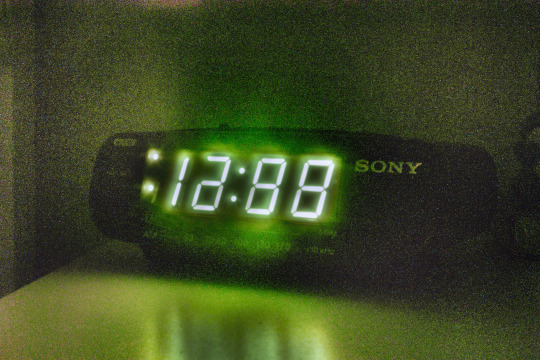
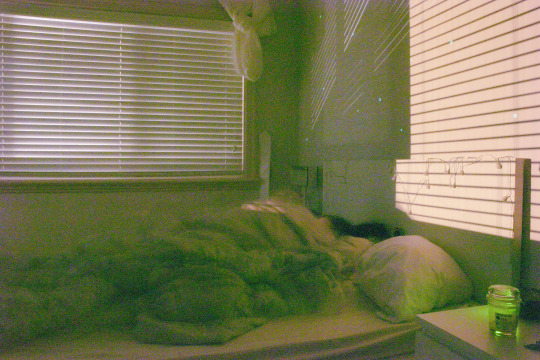
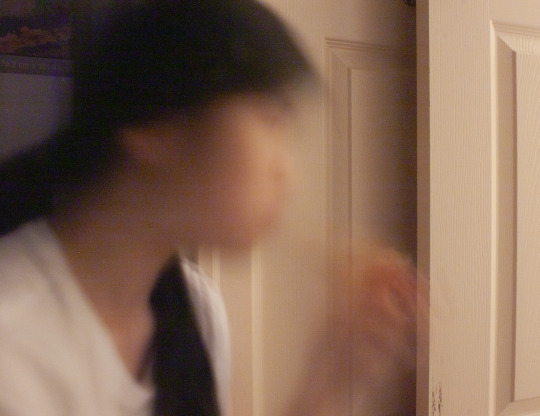
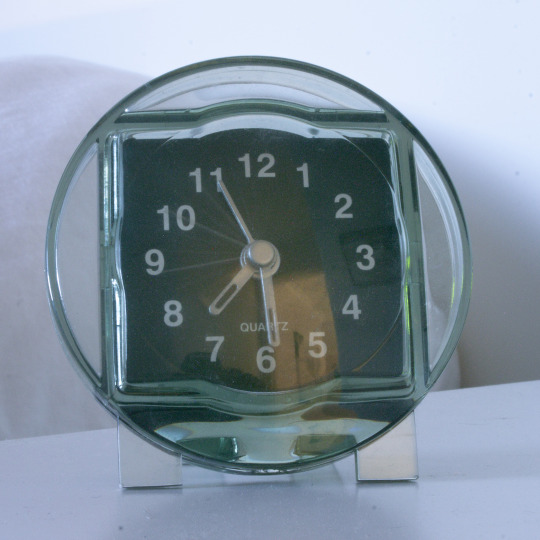
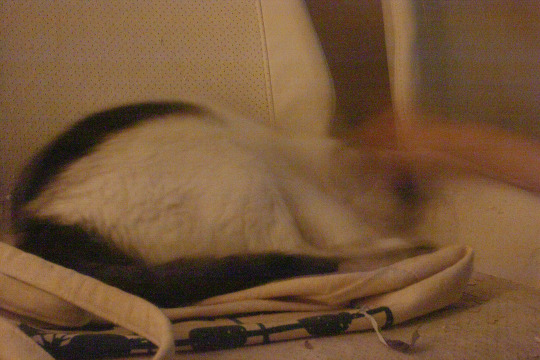
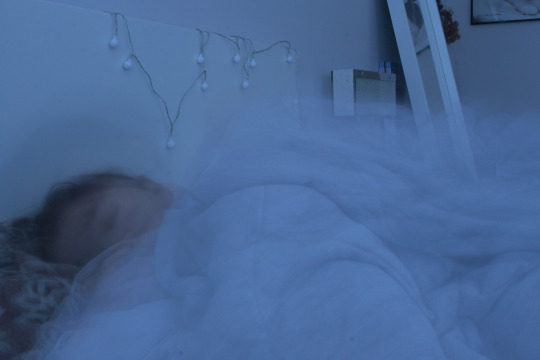


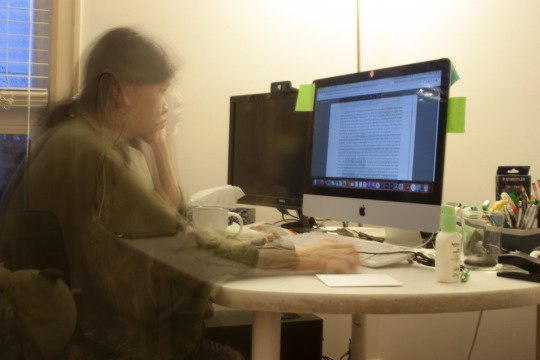

Space out of Time (2022) photography, series of 10
individual titles:
44 Minutes and 45 Seconds (2686 seconds)
Sleeping for 31 Minutes and 36 Seconds (1896 seconds)
Eating an Apple for 6 Minutes and 16 Seconds (377 seconds)
60 Minutes and 45 Seconds (36445 seconds)
Petting Apple for 7 Minutes and 30 Seconds (451 seconds)
Napping for 5 Minutes and 15 Seconds (316 seconds)
Sleeping for 4 Minutes and 30 Seconds (270 seconds)
Phone Scrolling for 19 Minutes and 42 Seconds (1183 seconds)
Required Reading for 30 Seconds (30 seconds)
Staring at the Camera for 6 Minutes and 28 Seconds (388 seconds)
Space out of Time is about documenting time that passes without your notice. Spacing out, losing awareness, liminal spaces, compacted into an image through long exposure photography.
---
the final for my second year photography class! After seeing the beautiful They Watch the Moon by Trevor Pagan, I got interested in the long exposure aspect of it and the really beautiful green, hazy quality of the photo. So! I tried my hand at it
One of the few pieces of art that necessitated I take a nap to create it lmao. Set the camera up in my bedroom and kept the lil wireless shutter remote on my bedside table!
For the eating an apple one, during crit my teacher initially thought it was brushing teeth haha; they really liked the series though! yippee! It's not quite one of my favourites but it was very interesting to make (and fun!)
Here it is installed for crit (I remember my initial idea was to have it hanging from string like a mobile?? but I think I prefer how it looks like this):
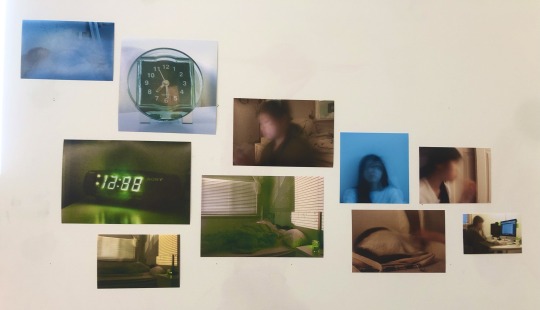
#photography#2022#space out of time#process#long exposure#uni#44 Minutes and 45 Seconds (2686 seconds)#Sleeping for 31 Minutes and 36 Seconds (1896 seconds)#Eating an Apple for 6 Minutes and 16 Seconds (377 seconds)#60 Minutes and 45 Seconds (36445 seconds)#Petting Apple for 7 Minutes and 30 Seconds (451 seconds)#Napping for 5 Minutes and 15 Seconds (316 seconds)#Sleeping for 4 Minutes and 30 Seconds (270 seconds)#Phone Scrolling for 19 Minutes and 42 Seconds (1183 seconds)#Required Reading for 30 Seconds (30 seconds)#Staring at the Camera for 6 Minutes and 28 Seconds (388 seconds)#exhibition#show
3 notes
·
View notes
